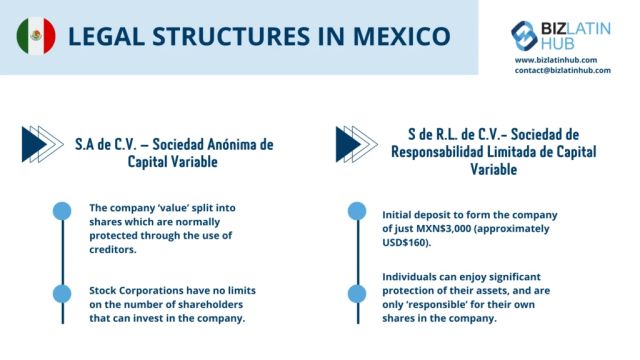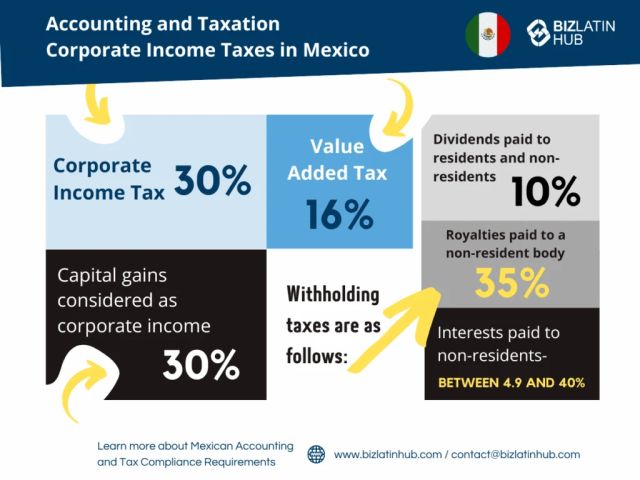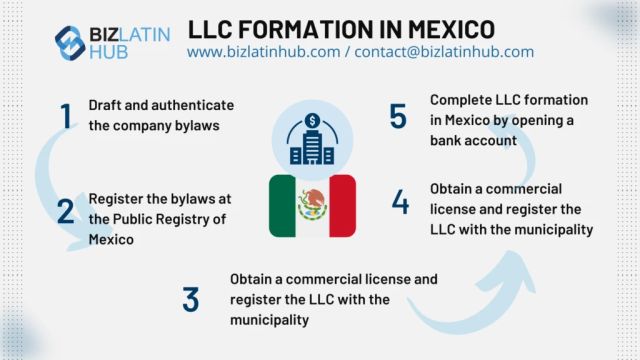[ad_1]
To print this article, all you need is to be registered or login on Mondaq.com.
Mexico is the second largest economy in Latin America and is
growing at an astonishing rate. Despite a slight deceleration in growth in
2018, mostly triggered by a struggle to recover from the
earthquakes in September 2017 that shook, economically and
physically, the capital to its core, Mexico is comfortably one of
the most influential economies in the world and is estimated to be
the 7th largest global power in the world by 2050.
The most popular legal structures in Mexico are: Corporation (S.A),
Sociedad Anónima de Capital Variable (SA de CV), and Limited
Liability Company (S de RL).
In recent years, a number of highly competitive industries have
flourished and have rendered the Mexican market a far more varied,
dynamic and interesting platform for foreign investment than ever
before.

SA de CV & S de RL de CV. Types of Legal structures in
Mexico
One new market that has experienced particular success in recent
years is the emergence of new markets such as the production of
medical equipment and devices. As of 2016, this industry is valued
by ProMexico, the governmental agency responsible for encouraging
foreign investment, at over USD$13 billion.
This same report highlights savings of over 20% when compared to
fabrication in the US. This industry, as typifies all emerging
industries in Mexico, is driven by an incredibly well educated, and
economically accessible workforce. This ‘Holy Trio’ of
innovative industries, cheap fabrication costs and a qualified
workforce can be applied to any of the countless emerging
industries and has been the crucial distinguishing factor between
Mexico and other emerging economies.
The most straightforward way to tap into the goldmine of
opportunities that exist is to incorporate a Mexican
company directly into the local market. The following article
will focus on the 3 most common and most important types of
companies/legal entities that can be formed in Mexico. Keep reading
or go ahead and contact us
now to discuss how we can be of assistance.
These are the types of legal structures in Mexico:
- S.A de C.V. – Sociedad Anónima de
Capital Variable (Stock Corporation) - S de R.L. de C.V.- Sociedad de Responsabilidad
Limitada de Capital Variable (LLC- Limited Liability Company) - SAS- Sociedad por Acciones Simplificada
(Simplified Shares Company)
It is also worth noting that there are two more categories:
- SAPI: Sociedad Anónima Promotora de
Inversión (Stock Corporation for Investment Promotion) - SOFOM: Sociedad Financiera de Objeto
Múltiple (Multi Purpose Financial Company)>
REMEMBER: These final two corporate structures
focus on companies looking to enter the Mexican Stock Exchange
(Bolsa Mexicana de Valores, also referred to as the MexBol or the
BMV). For this reason this article will not go into detail on these
structures. If you have any queries regarding these company types,
do not hesitate to get in touch with our team.
S.A de C.V. – Sociedad
Anónima de Capital Variable (Stock
Corporation)
The key facts for the Stock Corporation and most popular legal
structure in Mexico are:
- The company is formed and the company ‘value’ split
into shares which are normally protected through the use of
creditors. - Stock Corporations have no limits on the number of shareholders
that can invest in the company. This means that raising the
necessary capital (MXN$50,000 – approximately USD$2,700) is
very achievable for new companies as an unlimited number of people
can contribute. - Although this structure includes certain bureaucratic and
administrative burdens, it is undoubtedly the structure that has
the largest potential for growth and profit.

SA de CV. Accounting and taxation in Mexico. Sociedad
Anónima
S de R.L. de C.V.- Sociedad de
Responsabilidad Limitada de Capital Variable (LLC- Limited
Liability Company)
The second most popular typeof legal structures in Mexico is the
Limited Liability Company. It is also based on shares and has the
following distinguishing features:
- An LLC is very accessible for SMEs with an initial deposit to
form the company of just MXN$3,000 (approximately USD$160). - Another advantage is that taxes are paid through individual
members tax return, rather than as a collective company. - Individuals can enjoy significant protection of their assets,
and are only ‘responsible’ for their own shares in the
company, as suggested by the name.
SAS- Sociedad por Acciones
Simplificada (Simplified Shares Company)
The third major legal structure in Mexico is the SAS, which is
mirrored in other Latin America jurisdictions such as Argentina and
Colombia. It is a relatively new concept that was announced in 2016
as part of the reforms to the General Law of Commercial Companies.
The advantage of this structure is clear and stems from the very
reason that this structure was introduced. Mexico is making
significant steps to open up their market for foreign investment,
and have made many reforms to different pieces of commercial
legislation to simplify and encourage foreign operations. The SAS
is a perfect example of this.
Some key characteristics of the Mexican SAS include:
- A relatively cheap, fast and simple formation process and
corporate structure, and is ideal for SMEs looking for an easy
route-to-market. - One potential problem involved with this corporate structure is
the fact that there is an annual maximum permissible profit of
MXN$5,000,000 (approximately USD$265,000). For this reason, the SAS
is preferred amongst SMEs as opposed to multinationals looking to
expand operations.

Steps for LLC formation in Mexico. SA de CV. Sociedad
Anónima
Don’t Forget: It is possible to adjust your
legal entity to have a new corporate structure if your company
reaches a point where it is making profits exceeding this limit of
MXN$5,000,000.
Your specific business objectives and requirements will impact
on the ideal corporate structure for your company. Before jumping
in and incorporating a type of legal structures in Mexico, it is
best to consult with local experts who can guide you towards the
best type of legal structure based on your Mexican operations.
self
Originally published 21 September, 2018 | Updated on: 27
June, 2023
The content of this article is intended to provide a general
guide to the subject matter. Specialist advice should be sought
about your specific circumstances.
POPULAR ARTICLES ON: Corporate/Commercial Law from Mexico
[ad_2]
Source link
